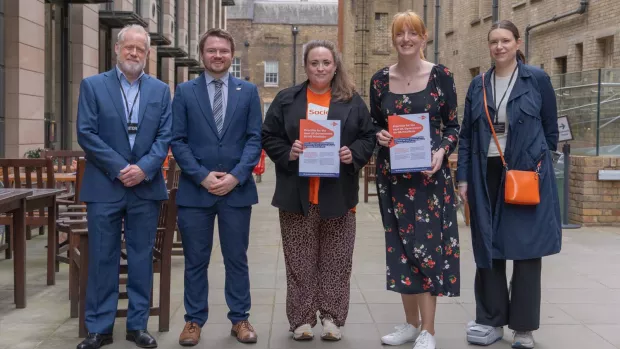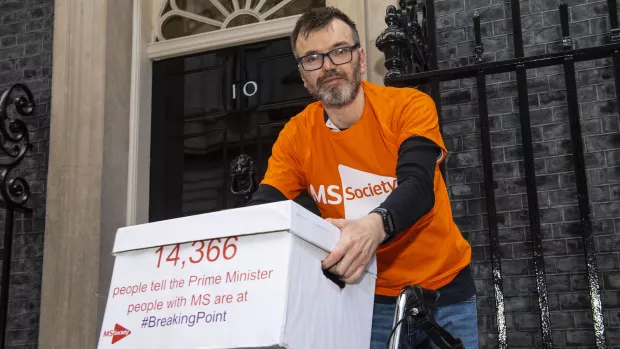
Unwelcome government consultation on PIP focuses on the wrong things
The UK Government has announced a consultation on PIP. But they’re looking at the wrong things. Read on to find out what the consultation means for people with MS – and what we’re doing in response to the consultation.
What have the government said about PIP?
Almost two weeks ago, Prime Minister Rishi Sunak announced that the UK Government wants to reduce the number of people receiving Personal Independence Payment (PIP). He said he wants to tackle Britain’s “sick note culture”.
Many of us who have gone through the PIP process were quick to call out the Prime Minister’s rhetoric and targeting of disabled people. Especially when so many of us continue to face a cost-of-living crisis.
On Monday, the government shared more details about its ideas on PIP and opened a consultation seeking views on their proposals. The consultation will run until 22 July.
On publication of the consultation, Ceri Smith, our Head of Policy said:
This consultation is cynical and cruel, unjustly targeting disabled people, including those with MS. MS can be debilitating, exhausting and unpredictable, and PIP is a lifeline to many, helping to fund the extra costs of being disabled. In many cases, it can actually help people stay in work and maintain their independence for longer.
If the government truly wants a ‘stronger, healthier and fairer society’, they should start by addressing NHS waiting lists and fixing social care. Instead, this approach will punish disabled people and push even more into poverty.
What ideas are the government looking into?
The government is looking at making changes to PIP in four key areas:
- Overhauling PIP assessments and making them condition-specific rather than based on what people can or cannot do due to their impairment or condition (currently referred to as ‘functional’ assessment)
- Reviewing the eligibility criteria for PIP applications – for example, changing how points are awarded during PIP assessments
- Changing PIP from a cash benefit into a voucher or catalogue system. Or asking people to claim back disability-related costs afterwards.
- Aligning support from PIP more closely with support from the NHS and local authorities. This is quite a broad set of proposals. But mainly it means combining assessments for PIP with support people receive from local services. Such as physiotherapy and mental health, aids and adaptations, and social care.
What does this mean for people living with MS?
The consultation document is called a Green Paper. It doesn’t contain any proposed legislation but sets out areas where the government think PIP can be reformed in future. The government has said this is the start of a process which would need further consultation and will likely need new legislation to make any changes.
This means that the government aren't planning to make new changes to PIP before the general election. We expect a general election to happen this year and the latest an election can take place is January 2025.
What is the MS Society doing?
We've been campaigning for improvements to the PIP application and assessment process for many years. We know the PIP process can be hugely stressful and humiliating for many people with MS. However, the ideas outlined in this consultation would make the situation worse, not better. Unfortunately, this is a missed opportunity to meaningfully review PIP and make sure disabled people get the support they're entitled to and can live independently.
We'll be looking at the Green Paper and consultation in more detail over the coming weeks. And we'll be listening to people living with MS to form our response to the consultation. We’ll also continue to call for the improvements to PIP we know are so urgently needed - especially for people living with fluctuating conditions, like MS.
How can I get involved?
If you want to stay in touch with us about our work campaigning on PIP, you can sign up to receive all our latest campaigns. Through getting involved with our campaigns, you’ll find out how you can make your voice heard about the big issues affecting people living with MS.


